
Information Communication & Society
Scope & Guideline
Cultivating Scholarly Conversations on Information and Communication
Introduction
Aims and Scopes
- Digital Communication and Social Interaction:
The journal investigates the dynamics of digital communication, including how social media and other online platforms reshape interpersonal interactions, community building, and identity formation. - Political Communication and Activism:
It explores how digital technologies facilitate political engagement, activism, and the dissemination of information, particularly in relation to populism, misinformation, and civic participation. - Media Studies and Cultural Production:
The journal examines cultural production in the digital age, focusing on how media practices are influenced by technological advancements and societal changes, including the role of influencers and digital content creators. - Algorithmic Governance and Ethics:
There is a strong emphasis on the implications of algorithmic decision-making and governance, addressing issues of transparency, accountability, and ethical considerations in digital platforms. - Social Inequalities and Digital Divides:
The journal addresses the social implications of digital technology, including how access to information and communication technologies affects marginalized communities and perpetuates inequalities. - Misinformation and Trust:
It critically analyzes the spread of misinformation and its impact on public trust in media and institutions, exploring strategies to enhance media literacy and combat disinformation.
Trending and Emerging
- Data Justice and Algorithmic Accountability:
A growing body of research is focusing on data justice, emphasizing the ethical implications of data collection and algorithmic decision-making, particularly regarding marginalized communities. - Digital Activism and Social Movements:
There is an increasing focus on how digital platforms are used for activism and social movements, exploring the role of social media in facilitating collective action and political engagement. - Mental Health and Digital Well-being:
Recent publications are increasingly addressing the relationship between digital media use and mental health, investigating how online interactions impact well-being and social support. - Intersectionality in Digital Spaces:
Emerging research emphasizes the importance of intersectionality in understanding how various identities (gender, race, class) interact within digital environments and influence experiences of inclusion or exclusion. - Platform Governance and Regulation:
The journal is increasingly exploring themes related to platform governance, including the regulation of social media and the implications of platform policies for free expression and public discourse. - Visual Communication and New Media:
There is a notable trend towards examining visual communication practices, including the role of images, memes, and video content in shaping public opinion and cultural narratives.
Declining or Waning
- Traditional Media Studies:
As the journal increasingly emphasizes digital interactions, traditional media studies—focusing solely on print or broadcast media—are becoming less central to its discourse. - Overly Generalized Theoretical Frameworks:
There appears to be a diminishing interest in broad, generalized theoretical frameworks that do not specifically address the nuances of digital environments and their sociocultural implications. - Static Models of Communication:
The focus on static models of communication that do not account for the dynamic and evolving nature of digital interactions is declining, as the journal increasingly favors more fluid and context-sensitive approaches. - Local Contexts of Digital Use:
There is a noticeable decrease in studies that solely concentrate on local contexts without considering broader global or transnational implications, as the journal seeks to encompass more comparative and cross-cultural analyses.
Similar Journals

Communication & Society-Spain
Illuminating Contemporary Issues in Communication and CultureCommunication & Society-Spain, published by Universidad de Navarra, is an esteemed open access journal dedicated to advancing scholarship in the dynamic fields of communication and cultural studies. Since its inception in 1988, the journal has maintained a commitment to disseminating high-quality research that engages with contemporary issues and contributes to the evolving discourse around communication theories and practices. With a commendable Q1 ranking in both Communication and Cultural Studies categories, it stands as a prominent source for researchers and professionals alike, reflecting its robust presence in the academic community—evidenced by its Scopus rankings placing it in the top percentiles within both fields. The journal's scope encompasses diverse perspectives and methodologies, thereby fostering interdisciplinary dialogue essential for understanding the complexities of communication in society. With a publication history that spans from 2010 to 2024 and a ranking of #87 out of 1304 in Cultural Studies, our commitment to open access ensures that impactful research is readily available to all, promoting further scholarly engagement and innovation.
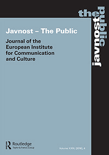
JAVNOST-THE PUBLIC
Pioneering Insights in Public CommunicationJAVNOST - THE PUBLIC is a prestigious academic journal that has established itself as a leading platform within the field of communication. Published by Routledge Journals, Taylor & Francis Ltd in the United Kingdom, this journal caters to researchers, professionals, and students interested in the multifaceted dynamics of public communication and societal engagement. With an impressive Q1 ranking in the Communication category as of 2023 and a Scopus ranking of #166/511, placing it in the 67th percentile, it is widely recognized for its rigorous research contributions and theoretical insights. The journal has been in continuous circulation since its inception in 1994, and it actively seeks to publish high-quality, empirical studies that explore the nuances of public discourse, media influence, and societal interactions. Though a traditional publication, JAVNOST - THE PUBLIC remains committed to advancing the field by offering valuable resources and knowledge crucial for addressing contemporary challenges in public communication.

Connectist-Istanbul University Journal of Communication Sciences
Promoting Scholarly Excellence in Communication ResearchConnectist-Istanbul University Journal of Communication Sciences is a distinguished academic publication under the auspices of Istanbul University, Faculty of Communication, dedicated to advancing the field of communication studies. Since its inception, this Open Access journal has facilitated the dissemination of groundbreaking research and innovative methodologies, particularly since it embraced an open access model in 2017, promoting wider accessibility and engagement. As a pivotal resource for researchers, practitioners, and students alike, Connectist fosters interdisciplinary dialogue, exploring contemporary issues in communication, media studies, and related disciplines. With a commitment to rigorous peer review and scholarly excellence, the journal serves as an essential platform for cutting-edge insights and developments in communication sciences, thereby contributing significantly to the academic community and beyond.
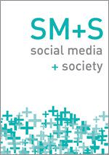
Social Media + Society
Illuminating the Impact of Social Media on Modern SocietySocial Media + Society is a premier, open access journal published by SAGE Publications Ltd, dedicated to the interdisciplinary exploration of social media's impact on society. Since its inception in 2015, this journal has rapidly established itself as a leading platform for scholarly discourse, evidenced by its impressive Q1 rankings across multiple categories, including Communication, Computer Science Applications, and Cultural Studies, as of 2023. With a Scopus ranking placing it in the top percentiles of its field, Social Media + Society provides profound insights into the evolving dynamics of social media technologies, their applications, and societal repercussions. The journal aims to foster a critical dialogue among researchers, professionals, and students, ensuring accessibility through its open access model, which allows readers to engage with cutting-edge research without barriers. Published in the United Kingdom, it serves as a vital resource for anyone interested in understanding the complex intersections of digital communication, culture, and technology.

Analisi-Quaderns de Comunicacio i Cultura
Navigating the evolving narratives of culture and communication.Analisi-Quaderns de Comunicacio i Cultura, published by Universitat Autònoma de Barcelona, is a distinguished open-access journal that has been serving as a pivotal platform for interdisciplinary research in Communication and Cultural Studies since its inception. With an ISSN of 0211-2175 and E-ISSN 2340-5236, this journal not only contributes significantly to its fields, as evidenced by its impressive rankings—Q2 in Communication and Q1 in Cultural Studies for 2023—but also boasts strong Scopus placements, including a rank of 181 out of 1304 in Cultural Studies. The journal's commitment to open access since 2010 ensures that research findings are readily available to a global audience, fostering collaboration among scholars, practitioners, and students. Located in Cerdanyola del Vallès, Barcelona, this publication invites contributions that explore the dynamic and rapidly evolving intersections of culture and communication, making it an essential resource for those seeking to advance knowledge and engage critically in these essential areas of study.
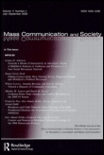
Mass Communication and Society
Pioneering Research in the Evolving Landscape of Mass CommunicationMass Communication and Society is an esteemed journal published by Routledge Journals, Taylor & Francis Ltd, focusing on the dynamic field of communication studies. With its ISSN 1520-5436 and E-ISSN 1532-7825, the journal has established itself as a leading platform for high-quality research since its inception. With a prestigious positioning in the Q1 category of Communication as of 2023, it ranks impressively at #45 out of 511 in Scopus within the social sciences communication sector, boasting a 91st percentile in its field. The journal serves as a vital resource for researchers, professionals, and students interested in emergent issues, theories, and methodologies related to mass communication and its impact on society. Although it does not offer Open Access options, the journal remains committed to advancing scholarly discourse and providing rigorous insights into how communication shapes social dynamics. Since its converged years from 2008 to 2024, Mass Communication and Society continues to push the boundaries of knowledge in a rapidly evolving academic landscape, making it a must-read for anyone invested in the communication discipline.
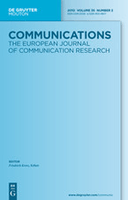
Communications-European Journal of Communication Research
Fostering Scholarly Excellence in Communication ResearchCommunications-European Journal of Communication Research is a premier journal published by DE GRUYTER MOUTON, dedicated to fostering scholarly discourse in the field of communication studies. With a publication history spanning over four decades, from 1976 through to 2024, this journal serves as a vital resource for researchers and practitioners interested in the latest advancements and theoretical developments in communication. The journal is recognized for its rigorous peer-review process and has earned a commendable reputation, evidenced by its ranking in the Q2 quartile in both Arts and Humanities (miscellaneous) and Communication categories for 2023. Its Scopus rankings signify its relevance and impact, positioning it within the top quartile of the discipline's literature. Although not an open access journal, it provides access to a wide range of research that contributes significantly to the understanding of communication practices across diverse contexts. Scholars, professionals, and students alike will find a wealth of knowledge that not only sharpens their academic pursuits but also enriches practical applications in the communication landscape.

Cuadernos Info
Innovating the Future of Communication and Information.Cuadernos Info is a distinguished open access journal published by Pontificia Universidad Católica de Chile, Facultad de Comunicaciones. Since its inception in 1984, this journal has served as a critical platform for the dissemination of innovative research in the fields of Communication and Library and Information Sciences. With a commendable impact factor and categorized within the Q2 quartile for both disciplines, Cuadernos Info positions itself as an influential resource, ranking #110 out of 280 in Library and Information Sciences and #214 out of 511 in Communication within Scopus, demonstrating its relevance and authority in scholarly discourse. By embracing a robust Open Access model, the journal ensures that research is accessible, facilitating knowledge sharing among academics, practitioners, and students worldwide. With its commitment to excellence and a strong focus on current trends, Cuadernos Info continues to be an essential resource for those seeking to explore the complexities of communication and information practices in contemporary society.

Eptic
Empowering Innovation in Science and Technology.Eptic is a prominent open-access journal published by the Universidade Federal de Sergipe, dedicated to advancing the fields of science and technology. Since its inception in 1999, Eptic has provided a platform for researchers, academics, and professionals to disseminate their findings, fostering a collaborative environment that encourages innovation and knowledge sharing within the scientific community. While the journal currently holds an ISSN of 1518-2487 and an E-ISSN of 1518-2487, its commitment to open access ensures that all published articles are freely available to a global audience, empowering students and researchers alike to contribute to and engage with cutting-edge research. The journal's impact within its field, although not quantitatively ranked in HIndex or Scopus, is evident in its dedication to quality and accessibility, making it a vital resource for those seeking to explore new ideas and developments in science and technology.
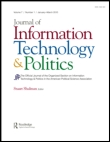
Journal of Information Technology & Politics
Bridging Technology and Political DiscourseJournal of Information Technology & Politics, published by ROUTLEDGE JOURNALS, TAYLOR & FRANCIS LTD, is a leading interdisciplinary journal dedicated to exploring the dynamic interplay between information technology and political processes. Established in 2008, this esteemed journal has garnered a reputation for its rigorous scholarship, achieving prestigious Q1 rankings in the fields of Computer Science, Public Administration, and Sociology and Political Science as of 2023. With its commitment to fostering critical dialogue and advancing research in these rapidly evolving areas, the journal serves as an essential resource for researchers, professionals, and students alike. Although it does not follow an open-access model, its impactful contributions are easily accessible through institutional subscriptions. The journal’s thoughtful examination of IT's role in politics is vital for understanding contemporary governance challenges and the implications of digital technologies on public policy and political behavior, making it indispensable for anyone engaged in this interdisciplinary domain.